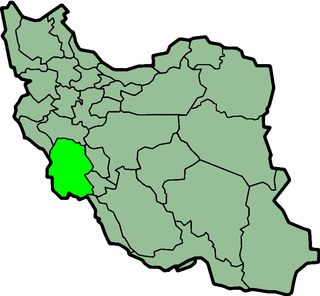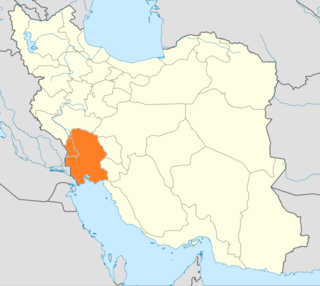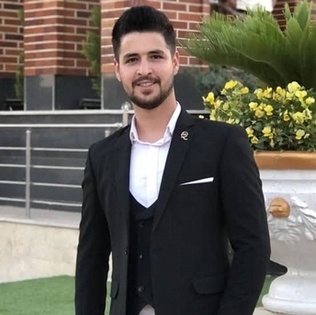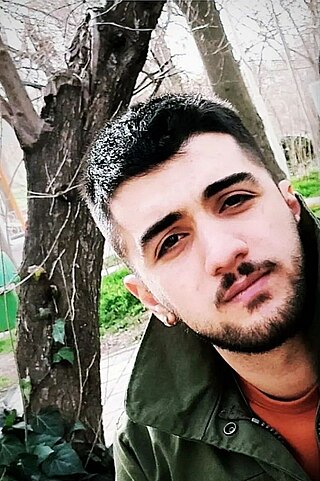Related Research Articles

A forced confession is a confession obtained from a suspect or a prisoner by means of torture or other forms of duress. Depending on the level of coercion used, a forced confession is not valid in revealing the truth. The individuals being interrogated may agree to the story presented to them or even make up falsehoods themselves in order to satisfy the interrogator and discontinue their suffering.

Khuzestan province is a petroleum-rich, ethnically-diverse province in southwestern Iran. Oil fields in the province include Ahvaz Field, Marun, Aghajari, Karanj, Shadegan and Mansouri. Amnesty International has voiced human-rights concerns about Khuzestan's Arab population, and United Nations special rapporteur Miloon Kothari has also drawn attention to Arab displacement and poverty among the Laks.

The state of human rights in the Islamic Republic of Iran has been regarded as very poor. The United Nations General Assembly and the Human Rights Commission have condemned prior and ongoing abuses in Iran in published critiques and several resolutions. The government is criticized both for restrictions and punishments that follow the Islamic Republic's constitution and law, and for "extrajudicial" actions by state actors, such as the torture, rape, and killing of political prisoners, and the beatings and killings of dissidents and other civilians. Capital punishment in Iran remains a matter of international concern.

Starting on 19 July 1988 and continuing for approximately five months, a series of mass executions of Iranian political prisoners ordered by Ayatollah Khomeini and carried out by Iranian officials took place across Iran. Many prisoners were also tortured. The killings took place in at least 32 cities across the country. The killings were perpetrated without any legislative basis and trials were not concerned with establishing the guilt or innocence of defendants. Great care was taken to conceal the killings.
Capital punishment is a legal penalty in Iran. The list of crimes punishable by death includes murder; rape; child molestation; homosexuality; drug trafficking; armed robbery; kidnapping; terrorism; burglary; incest; fornication; adultery; sodomy; sexual misconduct; prostitution; plotting to overthrow the Islamic government; political dissidence; sabotage; arson; rebellion; apostasy; blasphemy; extortion; counterfeiting; smuggling; recidivist consumption of alcohol; producing or preparing food, drink, cosmetics, or sanitary items that lead to death when consumed or used; producing and publishing pornography; using pornographic materials to solicit sex; capital perjury; recidivist theft; certain military offences ; "waging war against God"; "spreading corruption on Earth"; espionage; and treason. Iran carried out at least 977 executions in 2015, at least 567 executions in 2016, and at least 507 executions in 2017. In 2018 there were at least 249 executions, at least 273 in 2019, at least 246 in 2020, at least 290 in 2021, at least 553 in 2022, at least 834 in 2023, and at least 226 so far in 2024. In 2023, Iran was responsible for 74% of all recorded executions in the world.

In Islamic law, Ḥirābah is a legal category that comprises highway robbery, rape, and terrorism. Ḥirābah means piracy or unlawful warfare. It comes from the triliteral root ḥrb, which means “to become angry and enraged”. The noun ḥarb means 'war' or 'wars'.

The Arab Struggle Movement for the Liberation of Ahwaz is an Arab nationalist and separatist insurgent group which advocates the secession of an area in southern Iran including all of Khuzestan Province and Bushehr Province and parts of Ilam Province, Hormozgan Province, Chaharmahal and Bakhtiari Province and Kohgiluyeh and Boyer-Ahmad Province from Iran and the establishment of an Arab state, a goal which it is attempting to achieve by waging a direct and violent conflict against Iran. The claimed area is shown in the group's logo as well.
Capital punishment in Saudi Arabia is a legal punishment, with most executions in the country being carried out by decapitation (beheading) – Saudi Arabia being the only country in the world to still use the method. In 2022, recorded executions in Saudi Arabia reached 196, the highest number recorded in the country for any year over the last three decades.

Habibollah Latifi is a Kurdish Iranian law student at Azad University and a Kurdish activist who has been charged with Moharebeh and sentenced to death by an Islamic Revolutionary Court in Iran. He is charged with committing acts of violence in cooperation with the Party of Free Life of Kurdistan (PJAK) in 2007.

2005 Ahvaz unrest or 15 April Ahvaz Protests were violent riots, initiated by Iranian Arabs in the city of Ahvaz in southwestern Iranian province of Khuzestan. The unrest erupted on 15 April 2005, and lasted for 4 days. Initially, the Iranian Interior Ministry stated that only one person had been killed, however an official at a hospital in Ahvaz said that there were between 15 and 20 mortal casualties. Government officials blamed the unrest on Britain, whose troops based just across the border in southern Iraq. Following the unrest, several bombings were carried out in Ahvaz, killing 28 people. In 2006, Iran executed five Arab separatists, convicted of carrying out the bombings in 2005.
The United Arab Emirates Five are five activists who were arrested in April 2011 on charges of breaking United Arab Emirates law of defamation by insulting heads of state, namely UAE president Khalifa bin Zayed Al Nahyan, vice president Mohammed bin Rashid Al Maktoum, and Abu Dhabi crown prince Mohammed bin Zayed Al Nahyan, through running an website that expressed anti-government views.

Arab separatism in Khuzestan was a decades-long separatist Arab movement in the western part of the Khuzestan Province in Iran.
Gholamreza Khosravi Savadjani was a political prisoner in Iran who was executed on 1 June 2014. His execution was highly controversial due to accusations that Khosravi did not receive due process or fair treatment during his trial or leading up to his death.
Events in the year 2014 in the Islamic Republic of Iran.
The Arab Sharkas case is the name given to the military trial of nine men in Egypt in August 2014. Six defendants were sentenced to death in October, and executed in May 2015.
On 23 April 2019, the Kingdom of Saudi Arabia carried out a mass execution of 37 imprisoned civilians who had been convicted, 21 on the basis of confessions allegedly obtained under coercion and torture, for terrorism-related allegations in six provinces in the country. Fourteen of the people executed had been convicted in relation to their participation in the 2011–12 Saudi Arabian protests in Qatif, mostly on the basis of torture-induced confessions. The executions were carried out by beheading, and two of the bodies were left on public display. According to Saudi Arabia's Interior Ministry the convicts were all Saudi nationals. Thirty-two of those executed belonged to the country's Shia minority.
Majidreza Rahnavard was the first person executed in public for charges stemming from his involvement in the Mahsa Amini protests. Rahnavard was accused of fatally stabbing two Basij militia guards during a protest in November 2022, leading to him being charged with, convicted of, and sentenced to death for moharebeh. Rahnavard's execution occurred four days after the first protest-related execution, that of Mohsen Shekari.

Mohammed Ghobadlou was an Iranian man executed for his participation in the 2022 Mahsa Amini protests. He was charged with murder and moharebeh, which translates to "waging war against God", and was sentenced to death. He was accused of running over Iranian special police units in Parand city with a car, killing Farid Karampour Hassanvand and injuring five of police units.

Mohammad Mehdi Karami was a 21-year-old Iranian-Kurdish man who was executed by the Islamic Republic of Iran for his involvement in the Mahsa Amini protests. He was convicted of Fisad-e-filarz for allegedly being involved in the killing of a Basij militiaman during protests in Karaj commemorating the 40-day anniversary of Hadis Najafi's death. Karami was executed alongside 39-year-old volunteer children's coach Seyyed Mohammad Hosseini, another man who was also convicted of Fisad-e-filarz for his alleged involvement in the same killing. Both Karami and Hosseini asserted their innocence, and human rights organizations have accused Iranian authorities of using "shoddy evidence" to convict them.

Seyyed Mohammad Hosseini was a 39-year-old Iranian man who was executed by Iran's Islamic Republic for his participation in the Mahsa Amini protests. He was also known as Kian Hosseini. He was found guilty of Fisad-e-filarz for his alleged involvement in the murder of a Basij militiaman during demonstrations in Karaj during the 40th-day memorial of Hadis Najafi. Hosseini was hanged with Mohammad Mehdi Karami, a 21-year-old sportsman who was also convicted of Fisad-e-filarz for his alleged role in the same killing. Hosseini maintained his innocence throughout his detention and trial.
References
- 1 2 "Hashem Shaabani reveals falsity [of] accusations that led him to the death penalty". Ahwaz Studies Center. Archived from the original on 2014-02-22. Retrieved 2014-02-09.
- 1 2 "Iranian Execution of Poet Further Darkens Iran's Human Rights Record". Freedom House. 5 February 2014. Archived from the original on 2 March 2014. Retrieved 9 February 2014.
- ↑ Saeed Kamali Dehghan (19 July 2012). "Iran steps up crackdown against its Arab minority". The Guardian.
- 1 2 3 "Iran: End human rights violations against Iran's Ahwazi Arab minority". Amnesty International. 16 January 2014.
- 1 2 "Iran: Halt Execution of Arab Activists". Human Rights Watch. 11 July 2012.
- ↑ "Ahvazi Men Confessed Under Torture; No Evidence Supports Charges, Family Says". International Campaign for Human Rights in Iran. 9 February 2013.
- 1 2 "IRI Executes Two Ahwazi Arab Men". Iran Human Rights Documentation Center. 31 January 2014. Archived from the original on 26 March 2014. Retrieved 9 February 2014.